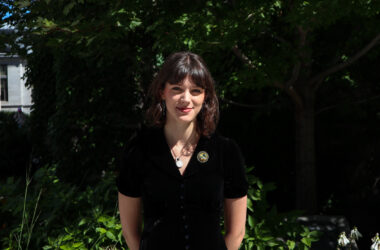Sometimes I wonder if I was destined to become the “Dad Friend.” The label attached itself to me well before my friends bought me “#1 Dad” socks for Christmas. It became almost certain when my roommate began saying “Thanks, Dad” as they slid over their leftover dinner for me to finish. By the end of my first year of university, I was forced to accept that I had slipped, inevitably and deeply, into this role––I even had the socks to prove it. By the time I looked up from doing the dishes the other day to explain that the song playing was actually a cover of the Grateful Dead, it was old news.
Ticking 21 of the 29 boxes on BuzzFeed’s “Are You the Dad Friend?” quiz, I have to ask myself: How did I get here?
At first glance, many of these behaviours result from an imitation of my own Dad. The jeans and plain sweater uniform, the habit of ordering black coffee, and the taste for goofy jokes certainly seem to support this argument. Perhaps lesbian stereotypes play a role as well; when it comes to button-downs and working with tools, I sometimes even out-Dad my own father.
However, I have come to believe that there is something deeper at play here. Some quirk of personality that underlies all these surface-level behaviors. But what is that, exactly? What is this “Dad essence” that my friends are constantly picking up on?
Asking around in preparation for this article, I got a variety of responses. Some friends emphasized a particular brand of “goofy intellectualism” or a “caring disposition,” two traits I think I can live with. But others noted a desire to educate, or even a feeling that they needed to meet my approval. This is about when a troubling word began to surface: “Paternal.”
“Paternal,” in itself, means simply “pertaining to a father.” However, its connotations are far-reaching, and its counterpart, “paternalistic,” which describes a government that makes decisions for its citizens out of a supposed sense that it knows their best interests, is an important reminder of the key role that unchecked power plays in fatherhood.
By nature, fatherhood involves an age gap, a degree of physical control over the home, financial authority, and, often, a gender imbalance. All of these factors, in combination with the emotional influence of having a child who will naturally seek their approval, contribute to a huge and unequal power dynamic between father and child. This creates an environment––as with any power dynamic––that can foster emotional distance, manipulation, and even abuse.
I am, as a result, in an interesting position. I have an “impression” of Dad-ness, but without the age gap, without the financial or physical power (as anyone who’s ever arm-wrestled with me will tell you) and also as someone assigned female at birth. So what does it mean, then, to be a Dad without the power imbalance? Does this position allow me to subvert the unique dynamics of gender, age, and control and make being a Dad Friend an act of rebellion against the patriarchy? Or, is this collection of habits and traits a result of internalized sexism, which recreates and reinforces existing power dynamics, even when the oppressor is absent?
This reminds me of a classic debate between second and third-wave feminists: The former seeking to imitate men to gain equal power and influence, the latter embracing femininity as its own, uniquely valuable, asset. Perhaps a rewatch of the Barbie movie is in order to help untangle my position here.
Either way, when I pause a movie for the fourteenth time in the first five minutes, or as I offer an unrequested explanation of the nuances between USB-A, USB-B, and USB-C cables, it bears taking a moment to pause and ask exactly what power structures I’m participating in, exactly what interpersonal relationships I’m emulating, and whether I’m working to dismantle or to strengthen them.







